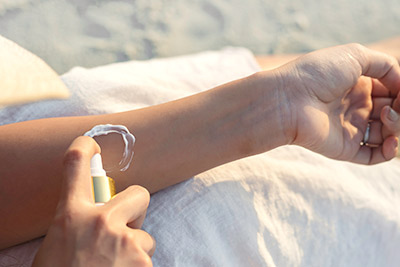

Outdoor activities such as barbecues, picnics, and hiking are commonly enjoyed throughout the summer. But while you’re having fun in the great outdoors, you need to protect yourself from foodborne illness, dehydration, sunburn, and other hazards. Reduce the chances of illness or injury when playing or entertaining outdoors by following a few simple rules.
Foodborne illness (food poisoning) is at greater risk during summertime, as families and friends gather outdoors for barbecues and picnics. Bacteria
Avoid spreading harmful germs by washing your hands thoroughly, especially after handling raw meat. Also, be mindful of the risk of cross-contamination by keeping raw meats, fish, and poultry separate from other foods, and carefully wash utensils and dishes that have been used for raw foods.
If you’re cooking outdoors, check the internal temperature of the food before it is served. You should keep a cooking thermometer handy for this purpose. Cook beef, lamb, and pork to an internal temperature of at least 145 degrees. Ground beef or meat should be cooked to 160 degrees, while you should cook turkey and chicken to a temperature of 165 degrees.
Also, cold foods should not be left at room temperature for more than two hours. Use ice or a portable cooler to keep foods chilled.
While you’re outdoors enjoying the warm summer sun, remember to increase your intake of water. Dehydration is more common during the summer, as you’re more likely to lose bodily fluids through perspiration. Also, be sure the kids stay hydrated while playing sports.
If you’re planning outdoor summer activities, you might want to enjoy them early in the morning or later in the day, when the sun is not as strong and temperatures are not as warm. You can also avoid dehydration by wearing lightweight, breathable clothing made of natural fibers, such as cotton.
Sunburn is most common during the warm summer months. The sun’s rays are also damaging to unprotected eyes. You always should wear sunscreen and sunglasses to filter out harmful ultraviolet (UV) rays. Wearing a wide brimmed sun hat may help as well.
You should also reapply your high quality sunscreen after swimming. Read and follow the directions on the label.
Camping and hiking is a fun summertime activity, although hazards do exist. Poison ivy and insect bites are common among hikers and campers. Fortunately, you can reduce the risk fairly easily.
Before going deep into the woods, use some type of insect repellent. You can buy insect repellent at most pharmacies, or you might try an all-natural repellent. Try some crushed lavender and reapply as needed. You should note, however, that you should never apply essential oils directly to the skin before going out in direct sunlight.
Dress properly to avoid being stung or bitten by insects. Wear hiking boots and tuck your pants inside. Wear light colored clothing and long-sleeved shirts if possible. Also, avoid wearing colognes and scented soaps and perfumes, as theses tend to attract insects.
All hikers and campers, including children, should know how to recognize poison ivy, oak and sumac, in order to avoid contact. Poison ivy and poison oak grow in clusters of three. Poison sumac will typically grow in pairs of 7-13 leaves.
In conclusion, if you should encounter any type of allergic reaction to a plant or insect bite, seek emergency treatment at once. Also, if a rash does not respond to over-the-counter treatment, see your physician or visit your family medical center for treatment. Contact Alafaya Woods Family Medical Center for more information.